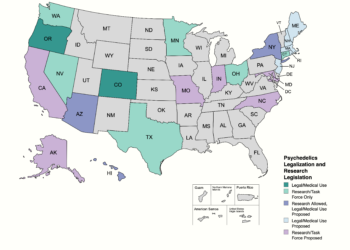Assuming that cannabis is moved to Schedule III, attorneys and accountants believe the tax impact on businesses could be immediate.
Attorney General Merrick Garland last month recommended that cannabis be moved from Schedule I to Schedule III. The public comment period on the proposed rule ends July 22, and already more than 17,000 comments have been submitted.
The Department of Justice is specifically seeking comments on the economic impact of the proposed rule. “DOJ acknowledges that there may be large impacts related to Federal taxes and research and development investment for the pharmaceutical industry, among other things,” it said.
By and large, this move would have almost no impact on consumers. It won’t make even medical marijuana legal. But it would bring an enormous benefit to struggling cannabis businesses as the 280E tax provision would no longer apply. 280E prevents businesses that traffic in Schedule I and II drugs from deducting ordinary business expenses, such as rent, marketing and equipment.
Businesses have been able to deduct the cost of goods sold, however. And some of the largest MSOs are challenging the tax rule and said they have received tax refunds. But smaller businesses that don’t have the means to hire aggressive attorneys and accountants have been paying the tax price.
“The 280E tax penalty often results in an effective tax rate north of 70% for state-legal cannabis companies,” said Josh Glasstetter, spokesperson for the U.S. Cannabis Council.
Dave McManus, tax partner and national cannabis leader at Massachusetts-based accounting firm AAFCPAs, said the firm serves approximately 120 cannabis businesses of all types, mostly along the East Coast. He said their clients could save tens of millions of dollars without 280E.
He said they are “all excited” about the potential move, but they have questions about the timing.
Tax law change expected to take immediate effect
If the DEA reschedules cannabis, the elimination of the 280E rule is expected to go into effect as soon as the final rule becomes effective, sources told CRB Monitor News. When rescheduling will happen is anyone’s guess, but many attorneys think we could see a final rule by the end of the year, if not by the November election.
“It seems to me the administration wants it to move as quickly as it can,” said Jonathan Haven, cannabis law practice co-chair at Saul Ewing.
Once it becomes effective, sources said they don’t believe the IRS will have to issue further guidance, other than possibly clarifying how far back the change would be retroactive.
“I think it’s fairly clear, once something is not in Schedule I or Schedule II, 280E doesn’t apply,” Haven said.
McManus agreed. “Technically, the day the rule is updated 280E no longer applies. The question comes back to whether the IRS provides any relief for the taxable year up to when rescheduling becomes effective,” he said in an email. “We don’t know if the IRS would say 280E is no longer effective 1/1/24 if rescheduling happens before the end of the year.”
In an interview, he said that when the 2017 Tax Cuts and Jobs Act was passed and tax rates dropped effective July 1 that year, he did have to work with two different tax rate periods. It would be a “real pain” to have to do that with cannabis, he said.
He added that once the change goes through, there would be a lot of room for interpretation about when 280E no longer applies to cannabis businesses. “Some could argue that it could go back as far as 2018, when Epidiolex was approved by the FDA,” he said.
And although cannabis would remain a controlled narcotic, the tax rule change may not be limited to medical-cannabis business activities. “280E doesn’t distinguish between medical and recreational,” McManus said. “Could they go that far? Maybe.”
“I think a lot of people expect the IRS will treat the 280E tax change on an ongoing basis,” Glasstetter said. But there will “almost certainly” be litigation as companies attempt to recoup taxes they already paid.
An IRS spokesperson said on background that the IRS is not in a position to comment until the law is changed.
Could there be an excise tax?
Outside the DEA’s formal rulemaking process, Congress could get involved and enact new laws that impact legalization and affect the marketplace, including adding an excise tax to recoup revenue losses.
“There is nothing preventing Congress from acting to make it a Schedule I narcotic, expand the scope of 280E, or impose a new excise tax,” McManus said.
Excise taxes may be applied to manufacturers, retailers or consumers and may be imposed at the time of sale or use by the manufacturer or retailer, or time of use by the consumer, according to the IRS.
The loss of federal tax revenue without 280E would be substantial.
In 2017, Congress considered an amendment to eliminate the 280E provision for state-legal cannabis in the Tax Cuts and Jobs Act. The Joint Committee on Taxation estimated that the government would have lost approximately $5 billion from 2018 through 2027, if it had passed. But many states have legalized medical and adult use since then, increasing revenues to Uncle Sam.
Research conducted last year by Whitney Economics posited that cannabis operators paid over $1.8 billion in additional taxes in 2022 when compared to ordinary businesses, and forecasted the amount to be $2.1 billion in 2023.
According to a Law360 op-ed citing FTI Consulting research, the top five multistate operators have paid $2 billion in taxes since 2020. Meanwhile, Greenwave Advisors says that the top six MSOs paid $1.6 billion from 2019 through 2023.
Recently, Trulieve told investors it received a $113 million tax refund for tax years 2019 through 2021, as it and other MSOs aggressively challenge the 280E tax rule.
The currently pending MORE Act (H.R. 5601), introduced in September by Rep. Jerrold Nadler, D-N.Y., would impose an excise tax as it also seeks to remove marijuana from the schedule of controlled substances.
The excise tax would start at 5% and go up to 8% by year five. Producers and exporters would pay a $1,000 occupational tax per year.
When the bill was up for consideration in 2022, the Joint Committee on Taxation estimated the government would gain $407 million in revenue in 2024 and $601 million in 2025, steadily increasing annually from there. If the law had taken effect July 1, 2022, the total revenue would have been over $8 billion from 2022 to 2031.
But Glasstetter noted that the MORE Act would deschedule cannabis and establish a regulatory system. He said that because cannabis would still be federally illegal with rescheduling, Congress would not impose excise taxes.
“Congress will almost certainly implement a federal excise tax when it eventually deschedules cannabis, but not before then,” he said in an email. “Rescheduling will not impact existing state cannabis markets, and regulation and taxation will continue to be set at the state level.”













